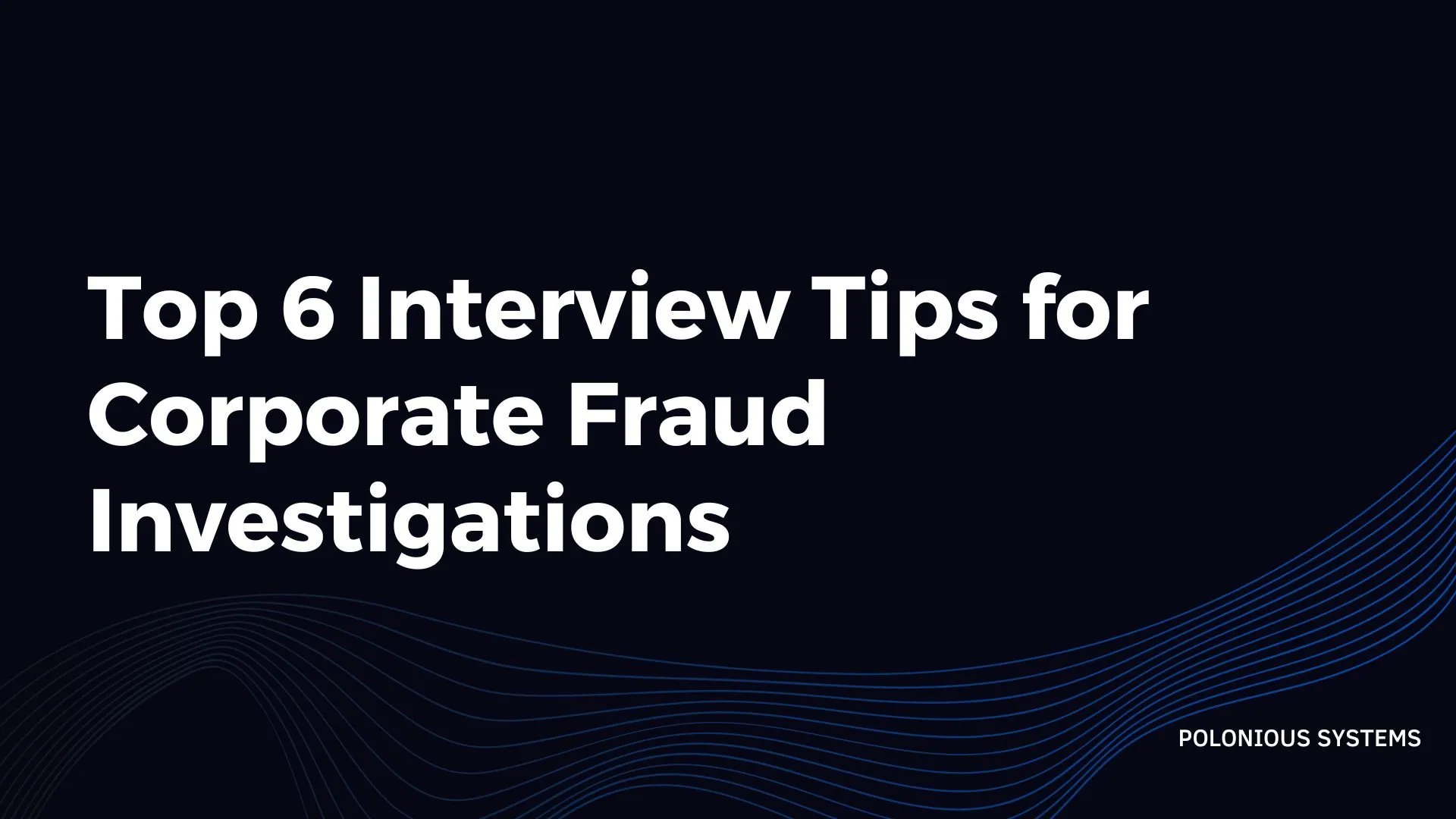In today’s economic climate, corporate fraud is rife on all levels, and though it often goes undetected, it can be catastrophically damaging to both individuals and corporations. PwC’s Global Economic Crime and Fraud Survey reports, internal perpetrators represent nearly half of all reported frauds.
Learn more about the different types of fraud in our 4-part series of corporate fraud where we cover:
- Asset Misappropriation
- Corruption
- Financial Statement Fraud
- Data, Intellectual Property and Identity Theft
Also, take a look at our blog: Top 6 Internal Investigations Pitfalls to Avoid in order to avoid making the same mistakes and to protect against risk.
A corporate fraud investigation is essential to gather evidence, identify defendants and trace misappropriated assets. When interviewing the suspect, an interviewer’s questions may lead directly to the truth or to a web of deception. A good interviewer applies a variety of techniques to ensure that the interview yields the most accurate and truthful answers.
This blog will cover Top 6 Interview Tips for Corporate Fraud Investigations.
Start with Background Questions
Every fraud interview should start as a simple conversation. The goal is to learn some background information while building rapport with the interviewee. After stating the purpose of the interview, start with questions regarding the interviewee’s background, including:
- How long have you been at the company?
- What job titles have you had, and what are the responsibilities of your current title?
- What is your normal day like? Normal week? Normal month?
Once certain responsibilities of the interviewee have been established, ask for some detail on their tasks. Ask questions like:
- How do you personally stay organised? What tasks do you prioritise?
- When performing the month-end reconciliations, when are they due? Who reviews your work? Do they ever have review points? Do they sign off promptly?
- Who covers your responsibilities if you’re out? Who do you interact with the most in the office on a daily basis? Who do you rely on to provide the data/documentation for you to be able to complete your tasks?
Spending the time to learn about the interviewee and the responsibilities of their position will set a nice tone for the interview. Encouraging the interviewee to talk about themselves helps earn some trust and develop rapport. Through this line of questioning, information can be learned about their position within the company and exposure to other employees, processes and controls. This can be valuable to the current interview and other interviews conducted throughout the investigation. It is important to start with background questions and to remain calm despite the stress that may come along with investigating a potential case of corporate fraud.

Set a Relaxed Tone
Sit across from the interviewee if possible, and assume a relaxed physical position. Use a smile and direct eye contact to begin the interview with a light and relaxed mood because dealing with a potential case of corporate fraud can be stressful for everyone involved. Use some summarised notes to keep you organised for the interview, but employ them as little as possible to keep from appearing disinterested or unengaged. Writing notes throughout the interview is typically necessary, but they should be written down quickly and in a summarised fashion, so as not to cause alarm or appear concealing to the interviewee.
Explain who you are and the purpose of the interview. Don’t lie about the reason you are talking, but keep it light. Examples might include:
- “This is just a standard part of our internal control procedures for the audit”
- “We just need to understand further details about a specific financial area, and you are one of the people we were told to speak to”
- “These interviews are all just part of an improvement study for certain systems/processes”
It is unnecessary to explicitly state the possibility of corporate fraud, especially because none of this is confirmed. The purpose of a successful investigation, is to derive accurate information rather than pro/disprove a potential case of corporate fraud. Start the interview by asking the interviewee how long they’ve been with the company. Ask what their specific job responsibilities are, who they report to, what a typical day is like for them. Earn their trust by listening and asking open-ended questions to allow them to keep speaking. Interviewees inherently become more comfortable when asked to speak about themselves, as well as when someone takes an interest in what they do each day. Ask for more detail when they speak of certain forms, lists, software or interactions that they have throughout the day.
The first 5 minutes of any one-on-one interview is the most crucial phase. You can create trust or distrust within the interviewee within seconds, based on your demeanour, attitude, and physical appearance.
Ask the Right Questions
Many interviewers tend to follow a script when performing interviews. Typically this list of questions is universal to all interviews for the day and asks common questions about seeing or reporting corporate fraud, seeing or reporting strange or unusual behaviour, etc. Although straightforward in nature, these questions will rarely get an interviewee to divulge information that the interviewer may find useful or informative. An interviewer can ask more appropriate questions throughout an interview that fulfil the requirements of these questions, without asking them verbatim.
Using specific questions about unusual behaviour in each of the interviewee’s job responsibility areas may be much more effective than a general question of abnormal activity within the organisation. Instead of asking a payroll clerk whether she knows of or has seen any cases of corporate fraud within the organisation, it makes much more sense to ask whether she has seen any odd entries or deletions in the payroll system, whether she’s ever been asked to override the system in some manner, what weaknesses exist within the hiring/termination process and whether past errors in timekeeping and paychecks were handled appropriately.
Use the following tips and lines of questioning to strengthen your interviews:
- Converse about an interviewee’s daily responsibilities using open-ended questions regarding atypical situations that might occur, and brainstorm with the interviewee about weaknesses in the process and how a corporate fraud or scheme could occur.
- Identify specific interviewee responsibilities that are prone to fraud and ask about instances in which they struggled to complete their tasks or had issues related to abnormalities within the process.
- Ask about areas that the interviewee used to be responsible for in the past that have since been taken away from them, and understand the reasoning behind the change.
- Ask what changes the interviewee would make to the process if they were in charge, and why.
- Ask the interviewee the main thing about their job that “keeps them up at night.” Typically, areas that concern or worry an employee the most may have levels of uncertainty that are indicative of risk, misstatement, or fraud.
- Finally, begin asking whether they have seen corporate fraud or unusual behaviour within any of the areas they work in, or in other departments.
By empowering the interviewee throughout the interview, you not only develop a trusted rapport with them, but you initiate a thought process within them that is more likely to remember and report anomalies from the past.
Dive into Deeper Questions
Once deep into an interview for a potential case of corporate fraud, interviewers are in a good position to start asking the harder questions. If this is a general fraud interview with no suspicion of corporate fraud, it’s time to ask the direct questions, such as:
- Have you participated in or witnessed fraudulent or questionable behaviour within the company?
- Have you ever been asked to participate in or ignore a fraudulent act with the company?
- Are there any activities of the company that you consider fraudulent, immoral or criminal?
If this is a corporate fraud investigation with specific allegations, now is the time to begin focusing on the known allegations, as well as any inconsistencies within the interview. Interviewers may want to begin to cross-reference their responsibilities with the information shared at the beginning of the interview, such as how they stay organised, who they report to, etc.
At the beginning of the interview, interviewees may exaggerate their responsibilities, motivated by a desire to tell the interviewer what they think they want to hear. But as the interviewer asks more questions and gets into more of the details of their responsibilities, shortcuts may be revealed, tasks they complete that aren’t reviewed, checks and balances that are being ignored or areas where their story just doesn’t add up. A good interviewer won’t let these items pass by. As these discrepancies are identified and real processes are clarified, interviewers should develop a clearer picture of the company, the likelihood of fraud and the potential involvement of the interviewee.
Remain Objective
With any investigation into allegations of corporate fraud or workplace misconduct, it is imperative that the investigator maintains a neutral and objective approach, and does not make “cut corners” in the investigation process. Following the proper procedurally fair process will not only ensure that your investigation is beyond unfounded criticism, it will also mean that you are being truly diligent in obtaining, collating, comparing and critically examining the evidence and making reliable conclusions on it.
Ensure Clarity
One major shortcoming in inexperienced fraud interviewers is their reluctance to reconfirm statements, revisit subjects and ask for more examples. Often, interviewers don’t like to give the impression that they don’t understand or need a second explanation, but this step is crucial to a successful interview. Revisiting a subject multiple times and asking for more examples not only provides clarity, but can also identify inconsistencies in the interviewee’s statements. Interviewers should regularly go back through the details of a certain procedure or process that the interviewee has already explained, asking for more detail and examples, with questions like:
- I don’t understand this specific process. Can you explain to me what the senior accountant’s role is again?
- It doesn’t make sense to me that the checks are signed without the supporting documentation present. Can you walk me through the process again so I can understand the timing of the review?
The least of an interviewer’s worries should be looking uninformed or foolish. Nothing should get in the way of gaining a full understanding of what the interviewee is explaining.
How Polonious can help you fight corporate fraud
Corporate fraud is a risk to all businesses regardless of size or industry. Being able to conduct an effective internal investigation is essential for the day-to-day operation of your organisation. There are countless tools you can use to run investigations more efficiently and effectively.
A well-conducted internal investigation helps ensure that those who have engaged in improper conduct are identified as having done so, and are dealt with appropriately. It can also ensure that those who have been wrongly suspected or accused of having engaged in improper conduct have their circumstances clarified and the suspicion removed. Polonious provides an investigation workflow tool which creates consistent, procedurally fair investigations while minimising admin work through automation.
Polonious’ ISO27001 certified security ensures your evidence and case files are stored securely, while our detailed security configuration ensures you can keep employees fully anonymous, or known only to specific individuals, depending on the level of anonymity requested.
An effective internal investigation helps reinforce better workplaces and protects the company from large fines, damages, negative publicity, etc. As the fraud environment becomes increasingly complex, we can help you detect and prevent corporate fraud by ensuring effective corporate governance.
Let's Get Started
Interested in learning more about how Polonious can help?
Get a free consultation or demo with one of our experts




